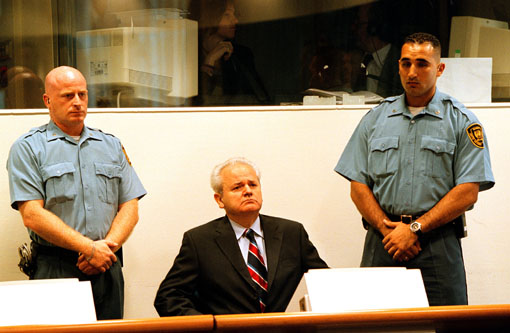“This Tribunal, and this trial in particular, give the most powerful demonstration that no one is above the law or beyond the reach of international justice.”
Prosecutor Carla Del Ponte, in her opening remarks in the trial of Slobodan Milošević.
The proceedings against Slobodan Milošević were a turning point for international justice and of critical importance to peoples of the former Yugoslavia most affected by the crimes with which he was charged. The Tribunal demonstrated that not even the president of a country could use his position of high office to claim immunity from prosecution, and that societies need not live for decades in denial about the role their highest leaders played in committing crimes. Indeed, the multitude of evidence submitted in the Milošević trial, much of it never seen before, may be considered its greatest achievement: it remains a part of the public record—accessible to the public, a barrier against malign attempts to revise history.
|
|
On 24 May 1999, when the Tribunal indicted Slobodan Milošević, at the time the former President of the Federal Republic of Yugoslavia, for crimes in Kosovo he was the first sitting head of state to be charged with war crimes by an international tribunal. The conflict in Kosovo was still raging on that day when the Prosecutor announced the indictment, making the Tribunal the first international law enforcement agency to respond to massive crimes in real-time. After the conflict ended weeks later, and international forces moved into Kosovo, the Tribunal managed the investigation of one of the largest crime scenes in modern history, coordinating with forensic teams from a dozen countries that exhumed many hundreds of bodies.
Media from around the globe converged on the Tribunal on 29 June 2001 when Slobodan Milošević was transferred in to the Tribunal's custody from the Republic of Serbia where he had been briefly detained on charges of misappropriation of funds and abuse of office. His transfer shocked many of the skeptics who did not believe that Milošević would ever be brought to account and face trial in The Hague.
The trial’s opening on 12 February 2002 was met with similarly intense interest. By then, in addition to facing charges for crimes in Kosovo, the Tribunal had confirmed indictments against Slobodan Milošević for crimes in Croatia and Bosnia and Herzegovina from 1991 to 1995 while he was President of the Republic of Serbia. This indictment was the result of years of painstaking investigations into many dozens of crimes, the direct perpetrators who committed them, the mid-level leaders they reported to, and finally the highest-level authorities who the Prosecution alleged Milošević conspired with to rid vast swathes of territory of non-Serbs.
The Tribunal's Prosecution presented evidence of Milošević’s involvement in many dozens of crimes against many thousands of victims in three different countries spanning a period of almost ten years. Using procedural innovations, such as submitting a number of witness testimonies in written form, the Prosecution presented its case in 90 sitting days of trial, a remarkable accomplishment for a case of such volume and complexity.
From the outset, the Trial Chamber balanced the interests of the victims to have evidence of such a multitude of crimes heard and the right of the accused to a fair and expeditious trial. Hundreds of thousands of viewers who watched the trial live in Serbia saw the Trial Chamber's even-handed approach, and its efforts to see to it that Milošević’s rights were respected to the fullest. The Trial Chamber granted Milošević, who had chosen to represent himself, extra time to cross-examine Prosecution witnesses and to present his defence evidence. Taking into account Milošević’s health issues, the Trial Chamber shortened both the trial’s work day and work week, and cancelled trial on 76 days due to his bouts of illness. On the calendar, the trial lasted four years; the actual presentation of the prosecution and defence evidence had in fact taken only 14 months.
Much of the evidence the Tribunal's judges heard had never been seen before. Many witnesses, including at the highest-levels of power in the countries of the former Yugoslavia and the international community, spoke for the first time about key events during the wars of the 1990s. Dozens of victims had the opportunity to have their painful and tragic stories heard and recorded for posterity. In addition, many documents, video tapes and intercepted telephone conversations made their debut in the Tribunal’s courtroom. Among the documents were a number that were confidential official documents that might never have been accessible to the public, but for Milošević’s trial.
At the end of the Prosecution’s case, the Trial Chamber reviewed all of this evidence and issued a decision that a reasonable judge could convict Slobodan Milošević on all counts, with the exception of some crime scenes within several of them. The decision does not state that the judges would or should convict him.
The trial formally ended on 14 March 2006, following Slobodan Milošević’s death in the Tribunal’s Detention Unit on 11 March 2006, just weeks shy of the trial’s scheduled conclusion. A thorough inquiry performed by Dutch and Tribunal authorities determined conclusively that Milošević’s death was from natural causes.
Slobodan Milošević’s death did not leave victims of the crimes with which he was charged without justice. The Prosecution indicted a number of his co-perpetrators who helped him to plan and execute the crimes that resulted in so much suffering. Some, such as Croatian Serb leaders Milan Martić and Milan Babić, and Bosnian Serb leaders Momčilo Krajišnik and Biljana Plavšić, have already been convicted. A number of others are currently on trial.


